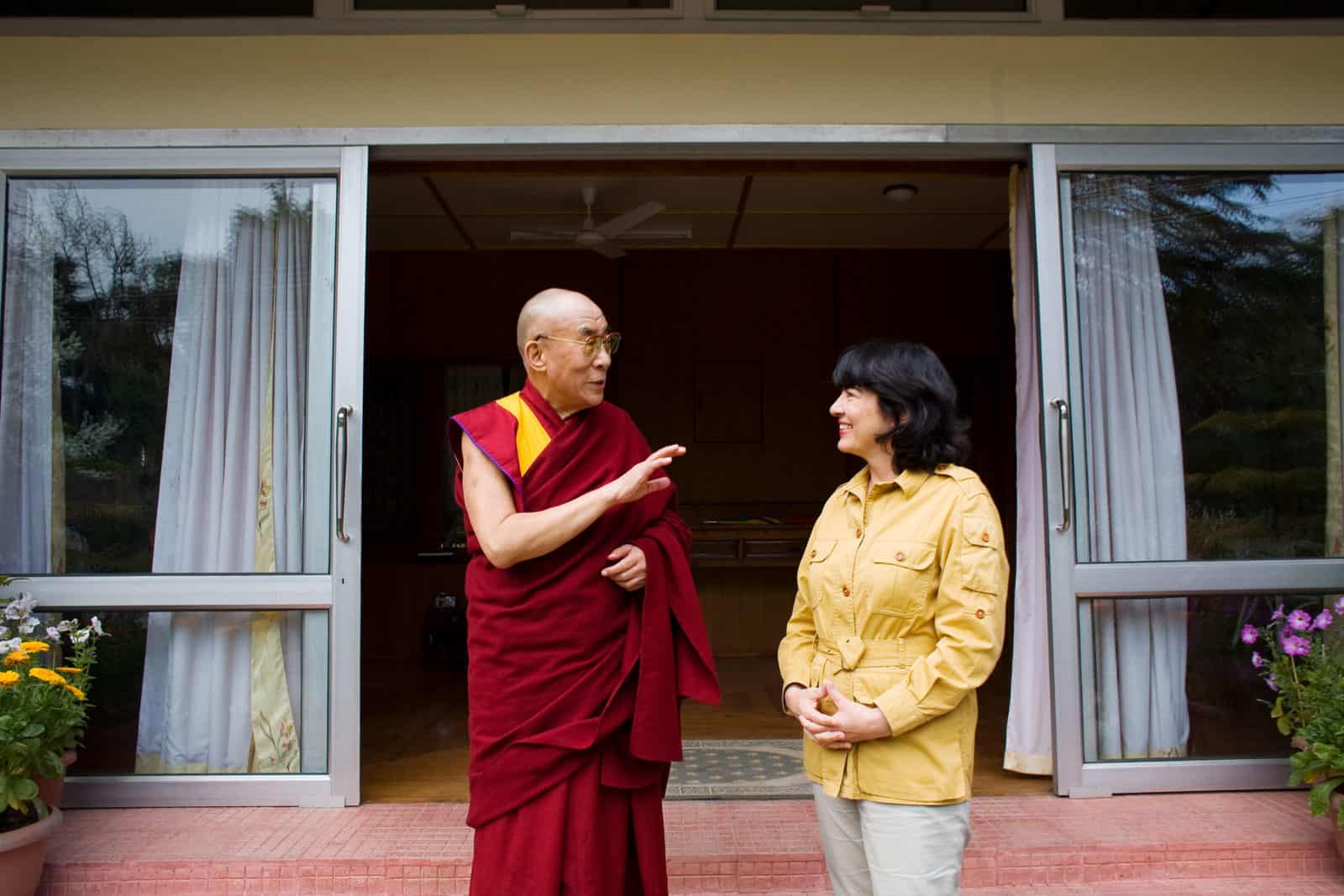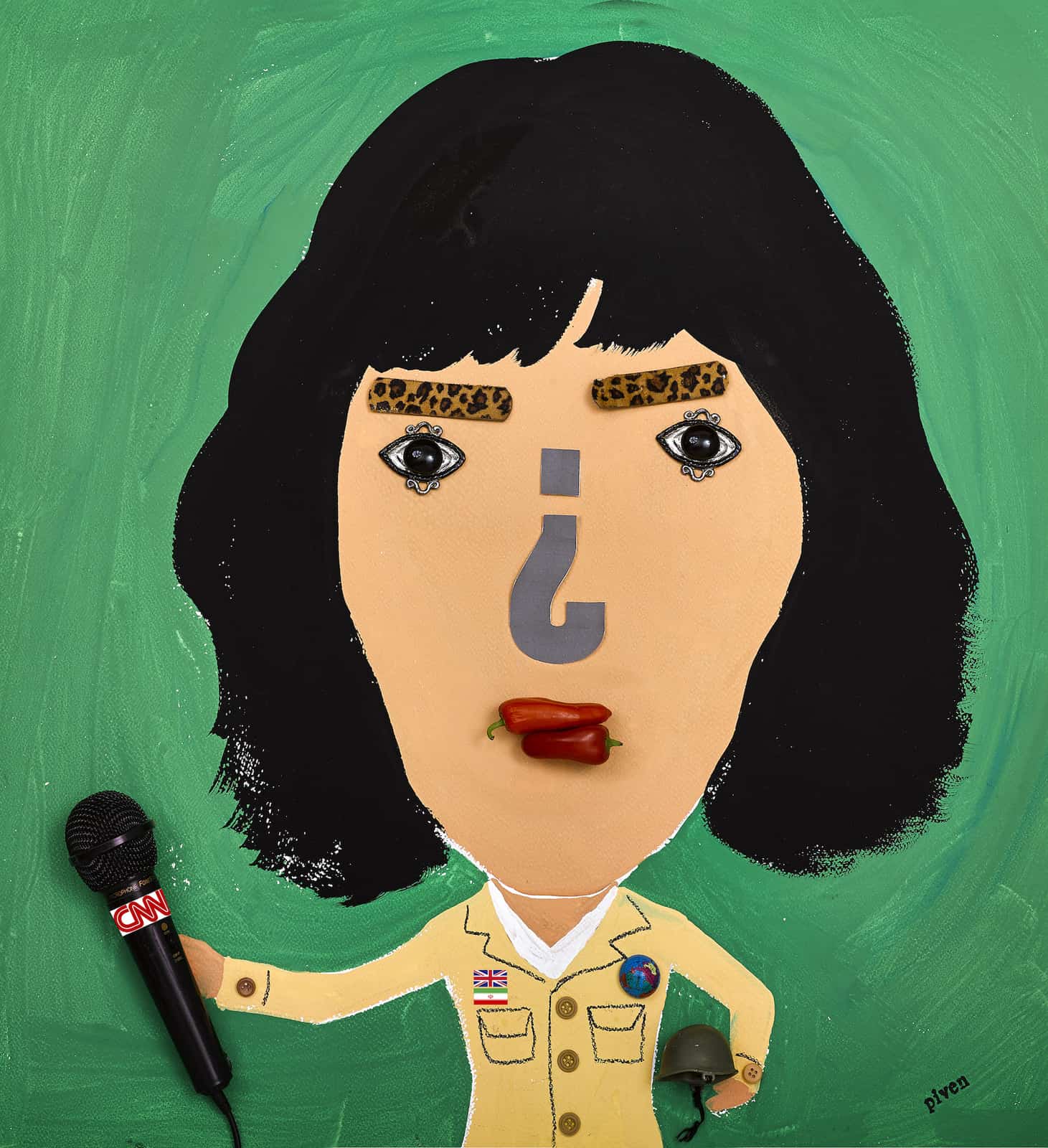ILLUSTRATION BY HANOCH PIVEN
For three decades, Christiane Amanpour’s brand has been crisis. First as CNN’s chief international correspondent and later as anchor of the network’s daily interview program Amanpour, she has reported from war and disaster zones around the world (Iraq, Afghanistan, Somalia, the Balkans, Rwanda, New Orleans during Hurricane Katrina) and interviewed countless controversial leaders (Bashar al-Assad, Muammar el-Qaddafi, Mahmoud Ahmadinejad). No matter how dangerous or distressing the situation, she has always kept her cool, earning the respect and trust of the world.
Now, the 60-year-old journalist is stepping into a new role following the #MeToo crisis. This month, she debuts Amanpour & Company, filling the spot vacated by disgraced former anchor Charlie Rose. The new hour-long public affairs program, a collaboration between CNN and PBS flagship station WNET, will feature Amanpour in conversation with global leaders, as well as contributions from Michel Martin of NPR’s All Things Considered, Walter Isaacson of the Aspen Institute, Alicia Menendez of the Latina to Latina podcast, and Hari Sreenivasan of PBS NewsHour Weekend. “I have never thought of my work and my career in terms of being a woman,” Amanpour says, “but I am pleased now to be doing my bit for women’s empowerment, for the advancement of women, certainly in our business, and, I hope, in many workplaces.”
How does it feel to take over this coveted time slot on PBS at this moment?
I am really very proud to be a woman stepping into this very prominent role. I think that women have been very capable and able throughout the years, and itu2019s great to see more and more of these vacated spots being filled by women. Iu2019m proud about it not just as a gender issue but as an equality issue, as a balance issue. It’s an opportunity to bring a wider sensibility and sensitivity to this kind of program, which I believe you need for explorations of international affairs, U.S. affairs, political affairs, cultural affairs. In all aspects of journalistic endeavor and exploration and investigation, you absolutely need to have a gender balance, because that’s what the world is: It is practically evenly divided between men and women. You can’t carry on this nonsensical look and exploration of our world through only the eyes of men.
What is making this possible? How can we keep addressing this gendered imbalance of power in journalism?
What we have right now is a moment that has forced the issue. It’s a long time coming, and I’m thrilled to be doing my little part to bring a little bit of—what’s the right word?—equality and justice to the system of journalism by putting more qualified women in positions that have become empty, and by not discriminating against women when it comes to certain top jobs. Obviously, there are a lot of women in the journalistic world, whether it’s in broadcast, in print, online, etc. But too often there are not enough in very key decision-making positions or the most visible national, nationwide, and global on-air positions. This is not just a vanity project or a human resources issue. It’s about genuine change—and to have genuine change and genuine balance in our world, you need to have gender equity and balance. Whether it’s politics, whether it’s culture, whether it’s sports, whether it’s film directors—it just makes sense.
I was watching a YouTube video of you on CNN’s Reliable Sources talking about #MeToo, and the ad that kept coming up was from Lacoste, featuring a man chasing a woman as she’s running away. At the end it said, “Life is a beautiful sport.” It was quite a juxtaposition.
Oh, my. Oops! That is funny.
Yeah, the culture is still kind of unmovable.
That’s why we have to keep pushing this. We have an amazing moment right now. The #MeToo moment has, I think, brought a tipping point, but we can’t just let it be about high-profile scalps. It has to be a proper political, cultural, social movement that brings women up to their rightful place in society. That’s the only way society and our world will be properly healed and properly serviced going forward.
How have you incorporated this approach into Amanpour & Company?
I’m going to be continuing to do what I’ve always done: focusing on all the global and U.S. issues, but with a wide perspective, not just from one perspective. I think that the addition of “the company,” so to speak, of two men and two women with different cultural influences and perspectives and professional experiences will add to the diversity.
Will the show focus more on cultural conversations than breaking news?
Absolutely. [But] I can assure people whou2019ve watched me for many years that they will continue to get more of the same. In other words, very interesting, rigorous, top-notch interviews from around the country and the world on issues, whether theyu2019re breaking news or explaining the news of the day. This will be a late-night program for many PBS stations and time zones, and so you want to give a good digest of what’s happening in the country and in the world—to get the best voices, the best perspective, to be able to sit back a little bit and digest the biggest stories and bring extra levels of understanding. We have more time to conduct interviews. These are not just short cable news interviews; they’re very thought out, well-researched conversations with world leaders. And when I say “world leaders” I mean in every field, not just elected leaders. I think that’s actually a pleasant development for me, to be able to broaden the context, broaden the perspective, to drill down several layers instead of asking maybe four questions and saying, “That’s all we’ve got time for.” Combined with the new company of correspondents, it will be something quite different.
It seems as if this sort of in-depth analysis and conversation is missing from the American TV news landscape.
It’s all about the instant observation now, whether it’s on social media, cable, the traditional nightly news, or morning news. This will be more thoughtful. We’ll be able to really look at the trending stories of the day and have the best interview that night to explain it or to add to it.
Do you feel that people are hungrier for in-depth reporting now? Or have we become too trained to expect the short, simple soundbite?
I think people are desperate to find brands that they can trust and explanations of some of the things that just get whipped around the stratosphere at warp speed. You know, you have one story in the morning, the story has changed by noon, and then changed again by the evening. Everybody’s constantly able to access all this information on a 24/7 basis. I do think that there is demand and there is a need to give more, to go deeper so the people can really understand and maybe not get whipped up into such a frenzy. I feel like so many readers, viewers, and online users are sort of in a state of panic and stress right now. I think now is a good, good time to be able to take this meaty look at what’s going on. It can be serious, it can be amusing sometimes, it can be something that’s hard news, something that’s softer news. Just show people that there is room for all sorts of different kinds of feeling and flavor and context in the national and international conversation.
Viewers know my style, which is to report without fear nor favor.
I read that early in your career, you faced some resistance from people not wanting to put you on air because of your dark hair and accent. There are still so many biases against women in positions of authority speaking authoritatively to other people in positions of authority. Itu2019s something that I feel youu2019ve navigated so well. How did you approach that minefield?
When I made that comment I was much younger, and I was reflecting on a time in American broadcasting, in the early u201980s, when most of the women on television had a pretty uniform looku2014particularly across the smaller markets and the medium-size markets. I didnu2019t fit that mold. I wasnu2019t blond, I wasnu2019t blue-eyed, and I certainly didnu2019t have an American accent, so I stood out too much. The entire landscape, obviously, has changed since I started as a desk assistant [at CNN in 1983]. Progressively, the look has changed dramatically to reflect a much broader, diverse body of professionals out there. I donu2019t have that issue anymore at all. In terms of being a woman and being taken seriously in the number of high-profile interviews I dou2014with world leaders, as well as ordinary human beings who I report onu2014I think itu2019s based on trust. Viewers have gotten used to seeing me, and they know exactly my style, which is to report without fear nor favor, to get all sides of the story, and to be very clear about seeking the truth and reporting the truth, and not being political about anything.
Do you miss being in the field, reporting from crisis zones?
Well, do you know what? I do, but I am also still in the field on many, many occasions. I went and did the summit between North and South Korea, and if one happens with Trump, Iu2019ll do that one. Last year, I traveled a lot doing a series that they had on CNN called Sex & Love Around the World. That was really a provocative title for exploring relationships that women were having in various cities around the worldu2014and their sexual and emotional development as well as the development of their basic human rights. It was fascinating, absolutely fascinating.

You have an 18-year-old son. How does he consume the news? Do you talk about your work at the dinner table?
Yes, of course, and he hears it in our conversation, and he hears it in conversation among other people. Weu2019ve got a lot of journalists in our family, and a lot of people whou2019ve been in public service, like his father [James Rubin, a journalist and former Assistant Secretary of State for Public Affairs]. He consumes the news mostly on his smart devices, but also seeing newspapers in our house, accessing various publications, watching television, seeing documentaries, sometimes watching my programs.
How do you escape the news?
Oh, I do a load of things. I love hanging out with my family; I love hanging out with my friends. I love going to nice dinners, movies, theater, museums, and galleries, and all those kinds of things, because in my career I witness so much of the harsh and bitteru2014the dark side of life. So much of it that I really make a beeline for the softer, beautiful side of life.
When you are diving into the dark side of life, what keeps you hopeful?
I know from personal experience that you can have political differences, you can have religious differences or come from different ethnicities, but you can still get on if youu2019re respectful of each other and youu2019re prepared to listen to the story of the other.
